ABOUT PEER
PEER is a Youth STEM promotion program for rural middle schools and high schools using veterinary medicine and environmental issues to stimulate youths’ interest in learning about their own health (“One Health”).
The benefit of an youth STEM promotion program in the university college of veterinary medicine (PEER) is to contribute to the development of diversity, inclusion, equality, and respect in the student body and faculty as well as enhancing the maturity, critical thinking, integrity, self-awareness, professional demeanor, and skills in communication, leadership, organization, and team work of veterinary students and pre-professional undergraduate students as they interrelate, explain, and share their veterinary medicine and science knowledge with K-12 students. Participants have included 90+ veterinary students, 66+ graduate students, and 135+ undergraduate students.
Teacher lessons/teacher training and k12 students in PEER provided vehicles (means) for dissemination on STEM knowledge and interest among female/minority/rural youth using veterinary medicine examples and provided vehicles (audiences) for training TAMU veterinary and undergraduate students. By capitalizing on youths’ (middle school in our case) interest in animals, one can discuss items like the fat dog/cat or offsprings/milk production in mammals (reproduction) in animals without the kid being the unfortunate subject of the lesson. Middle school students learn the vital signs of their fevered animal and discover humans have viral signs too. Also, NIH/NSF funding sources dictated inclusion of teachers and k12 students. Our k12 connection provided undergraduates service mechanisms for stronger graduate/med/vet school CV and applications. It allowed faculty to engage in outreach and add value (dissemination) to their grant applications as well as letting faculty do what they like best: share their interest with attracted others.
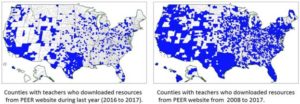
PEER MAGAZINES
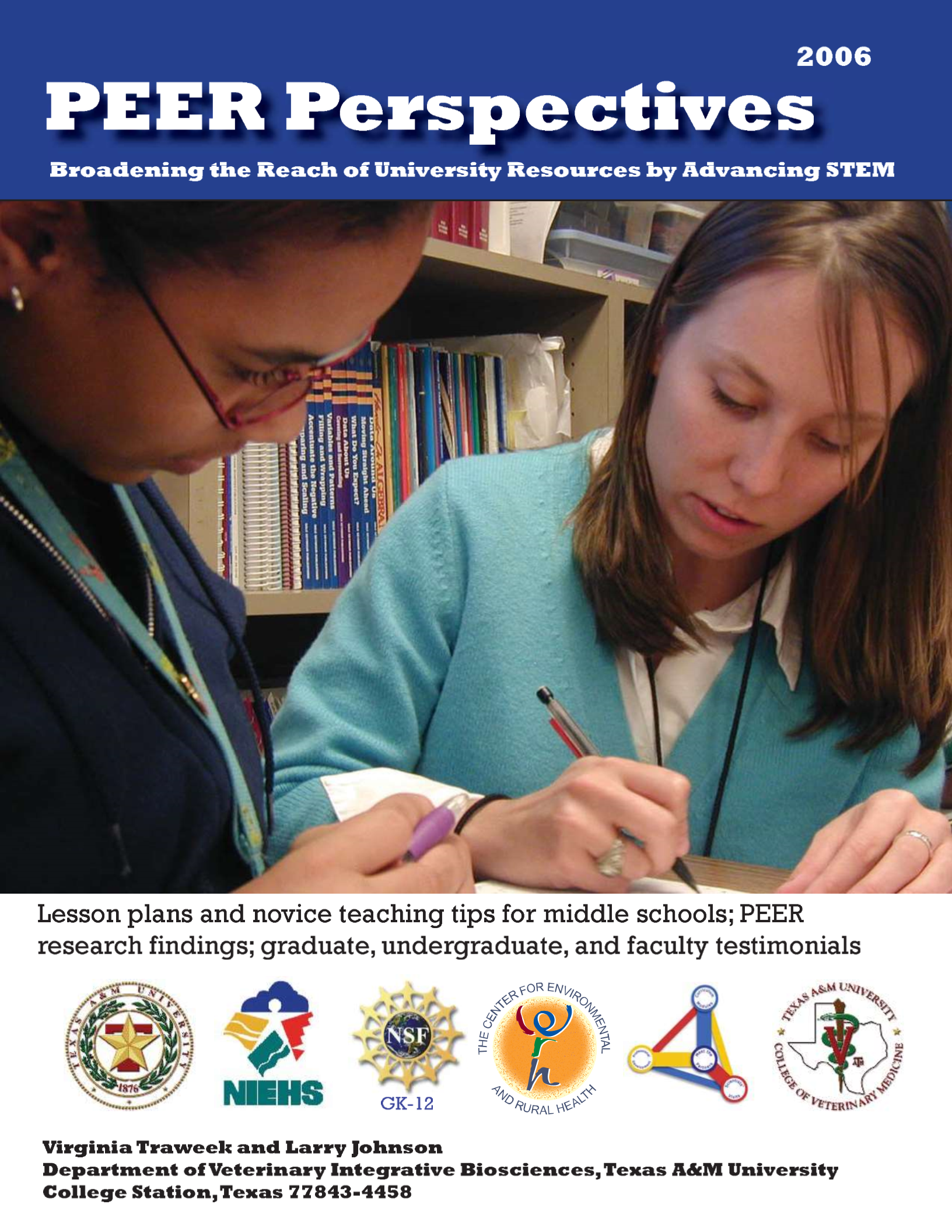
PEER Perspectives: Broadening the Reach of University Resources by Advancing STEM
Virginia Traweek and Larry Johnson. 2006.
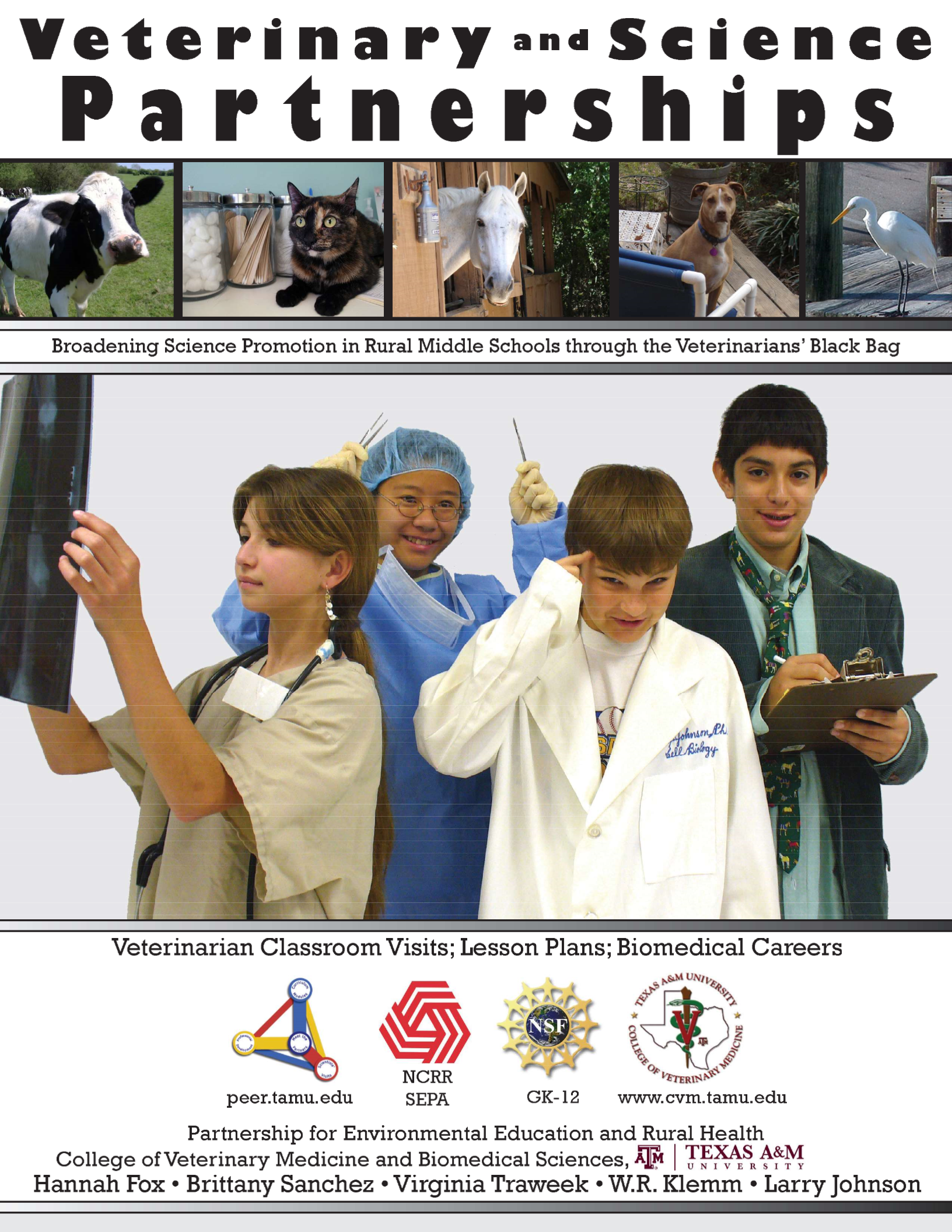
Broadening Science Promotion in Rural Middle Schools through the Veterinarians’ Black Bag
Hannah Fox, Brittany Sanchez, Virginia Traweek, W.R. Klemm, and Larry Johnson. 2010.
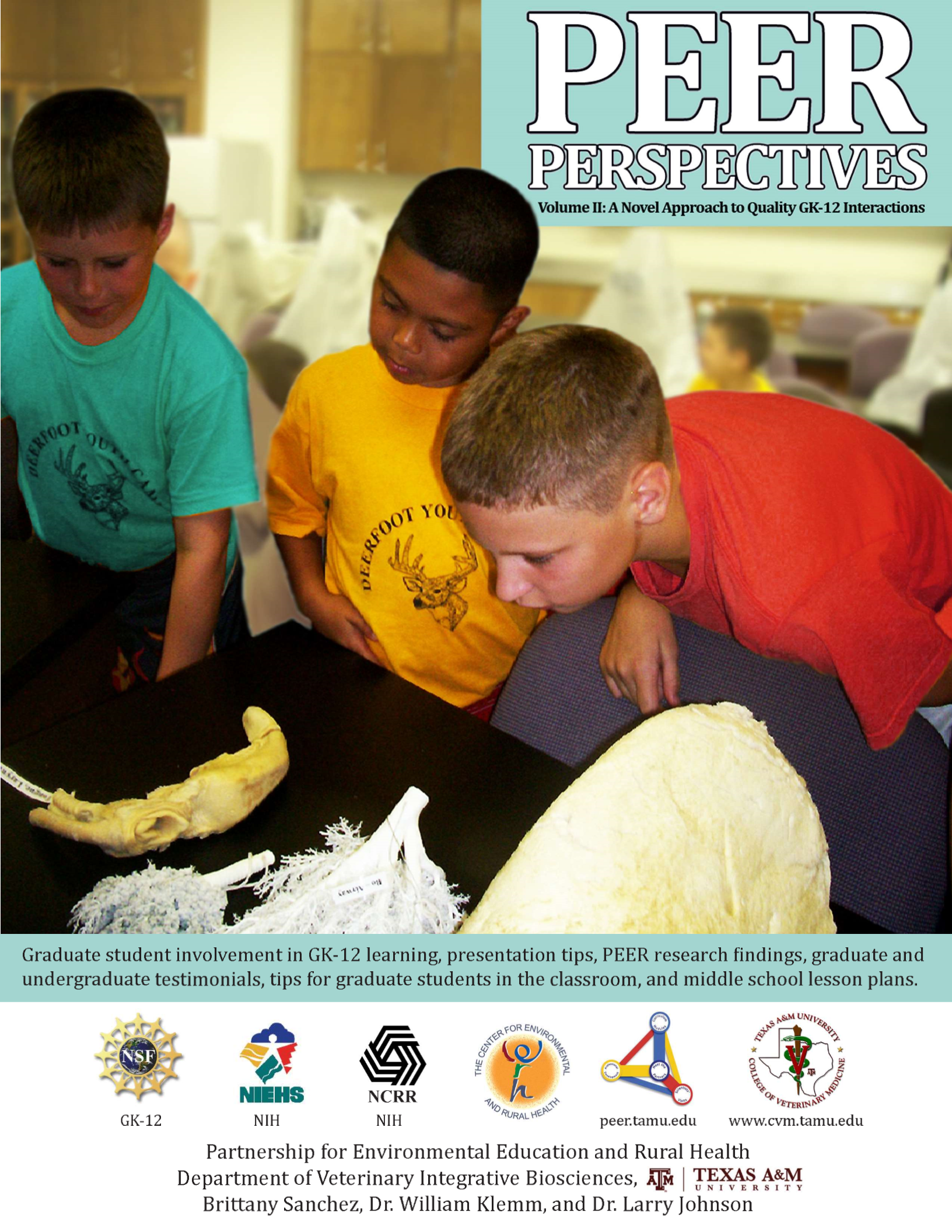
PEER Perspectives; A novel approach to quality GK_12 interactions
Brittany Sanchez, William Klemm, and Larry Johnson. 2010.
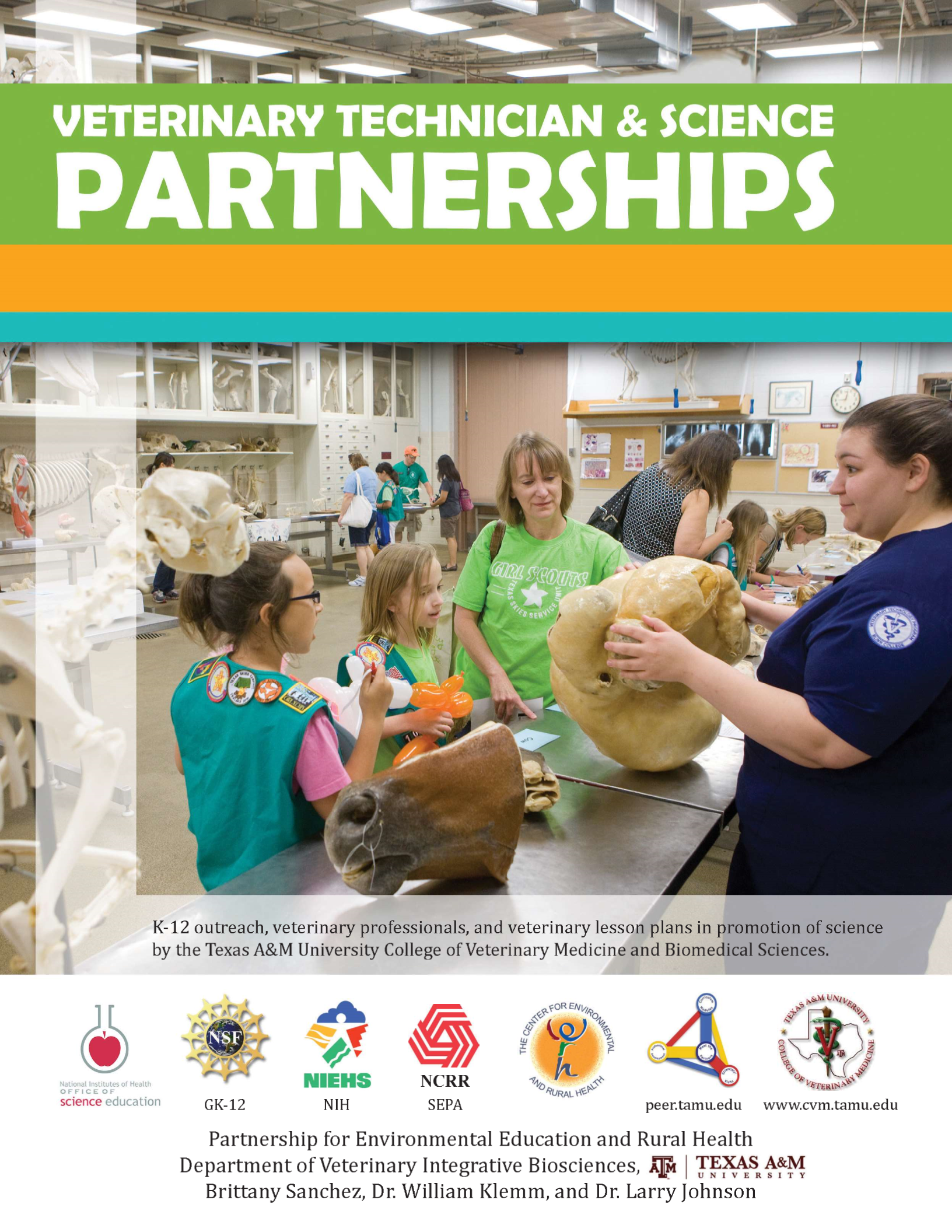
Veterinary technician and science partnerships
Brittany Sanchez, William Klemm, and Larry Johnson, 2011.
ABOUT THE PEER INTERDISCIPLINARY TEAM
The PEER interdisciplinary team is composed of scientists (including epidemiologist, physiologist, and neuroscientist, and educational psychologist), computer engineers, education specialist professionals, online curriculum-delivery specialists, and seasoned/award-winning middle school teachers.
ABOUT Julie Harlin
Julie Harlin assumed the role of PI of the project in February 2022. She is an Associate Professor in the Department of Agricultural Leadership, Education, and Communications in the College of Agriculture and Life Sciences and an Associate Dean in the Graduate and Professional School at Texas A&M University. She earned a Ph.D. in Agricultural Education from Oklahoma State University, and Master’s and Bachelor’s degrees in Agricultural Education and Agricultural Science from Texas A&M University. She began her career as a secondary agricultural science teacher before joining higher education and teaches graduate and undergraduate courses in teaching and learning in the context of agricultural education. Her research focuses on learner centered instructional design. She has won numerous teaching and service awards including the USDA New Teacher Award, the Southern Region American Association of Agricultural Educators Teaching Award, the Chancellor’s Academy of Teacher Education award, the College of Agriculture and Life Sciences Dean’s Distinguished Service Award for Teaching, the Richard Stadelman Faculty Senate Service Award, and served as speaker of the Faculty Senate in 2018- 2019. She has a passion for student success at all levels, PK-20. Dr. Harlin is a certified mediator, serves as a member of the board of trustees for a local school district, and volunteers as a court appointed special advocate for children in the foster care system.
Email: j-harlin@tamu.edu
ABOUT Christine Budke
Dr. Christine Budke is a professor of epidemiology and associate department head at the Texas A&M College of Veterinary Medicine & Biomedical Sciences. She obtained her veterinary degree (DVM) from Purdue University and a PhD in epidemiology from the University of Basel. Her research focuses on the epidemiology and burden of Neglected Tropical Diseases and Neglected Zoonotic Diseases. These diseases are common in regions of poverty and are considered neglected in terms of research and intervention focus. Many of these conditions not only affect human health, but also affect livestock health, resulting in a secondary social and monetary impact on poor agricultural and pastoralist communities. Dr. Budke has acted as a resource advisor for the World Health Organization Foodborne Disease Burden Epidemiology Reference Group and has contributed to the Global Burden of Disease Study. She is a Deputy Editor of the journal PLOS Neglected Tropical Diseases and an Associate Editor of the journal Preventive Veterinary Medicine. Her research has resulted in authorship of more than 100 peer-reviewed publications. Dr. Budke teaches epidemiology and public health at the undergraduate, graduate, and professional student levels and is the recipient of the Bridges Teaching and Service Award and the Texas Veterinary Medical Association Teaching Award.
Email: CBudke@cvm.tamu.edu
ABOUT Hank Walker
Dr. Duncan M. (Hank) Walker is Professor and Graduate Advisor in the Department of Computer Science and Engineering in the College of Engineering at Texas A&M University. He earned his M.S. and Ph.D. in Computer Science from Carnegie Mellon University, and Bachelor’s degree in Engineering from the California Institute of Technology. His research focuses on software engineering, and hardware and software testing. He spent many years developing and teaching the freshman engineering curriculum. He developed the current software engineering curriculum where student teams work with real customers to develop software to solve their problems. He has received the Texas A&M Lockheed Martin Aeronautics Company Excellence in Engineering Teaching Award, the E. D. Brockett Professorship Award, the Texas A&M Charles W. Crawford Service Award, and is an Association for Computing Machinery Distinguished Scientist.
Email: walker@cse.tamu.edu
ABOUT Nicola L. Ritter
Dr. Nicola Ritter received her Ph.D. in Educational Psychology from Texas A&M University in 2014 and M.Ed. in Curriculum and Instruction from Texas A&M University in 2009. Dr. Ritter joined the Veterinary Integrative Biosciences department at Texas A&M University as an Instructional Assistant Professor in 2016. Dr. Ritter’s research focuses on developing and evaluating educational resources. She is the lead investigator for and director of her research lab, the Center for Educational Technologies. She has received over $5.75 million in research funding, with the majority of funds from the United States Department of Agriculture, over 4 years. Dr. Ritter’s research focuses on the development and effectiveness of instructional materials. She has numerous original articles and copyrighted works. Dr. Ritter’s curriculum programs are used in 85 countries with over 4,000 students and 1,000 teachers reached. In addition to her research, Dr. Ritter oversees the CET’s service center consisting of 2 faculty and 7 technical staff. Dr. Ritter received the TAMU GoWeb award for Transformational Education in 2018.
Email: NRitter@cvm.tamu.edu
ABOUT Ian R Tizard
Dr Tizard is a University Distinguished Professor Emeritus at the College of Veterinary Medicine at Texas A&M University. He has taught Immunology for many years and written the standard textbook on the subject. His primary research interest involves the development of improved Vaccines and vaccination procedures for use in domestic animals and humans.
Email: itizard@cvm.tamu.edu
ABOUT Natalie M Johnson
Natalie Johnson is an associate professor at the Texas A&M School of Public Health. Her research interests include air pollution exposure, particularly effects on infants and children following prenatal exposure, including susceptibility to respiratory infections and asthma. Dr. Johnson is the vice chair of the Interdisciplinary Program in Toxicology. Dr. Johnson received her Bachelor of Science in biology and Doctor of Philosophy in toxicology from Texas A&M University. She was a National Science Foundation GK-12 fellow. She
completed a postdoctoral fellowship at Johns Hopkins University in environmental health sciences.
Email: nmjohnson@tamu.edu
ABOUT Gonzalo M Rivera
Dr. Gonzalo Rivera is an Associate Professor in Texas A&M AgriLife Research in the Veterinary Pathobiology Department. He received his DVM degree from the College of Veterinary Medicine at the National University of Rio Cuarto, Argentina, and his Ph.D. in physiology from Cornell University in Ithaca, New York. Dr. Rivera integrates cellular biology with vascular pathophysiology in his research and wants to contribute to the development of therapeutic interventions to fight cardiovascular disease and cancer. Dr. Rivera translate
curricular materials into Spanish.
Email: grivera@cvm.tamu.edu
ABOUT Timothy H Callaghan
Dr. Timothy Callaghan is an assistant professor in the Department of Health Policy and Management at the Texas A&M University School of Public Health. Dr. Callaghan received his doctorate in political science from the University of Minnesota. His research focuses on how politics, policy, and place work together to influence health in America. He has conducted extensive research on state political decision-making under the Affordable Care Act, individual health attitudes and behaviors, and health care access for vulnerable groups. Currently he is conducting research on the social, political, and psychological dimensions of vaccine hesitancy in the United States, with an emphasis on COVID-19 vaccine hesitancy. In addition, Dr. Callaghan serves as Director of Evaluation for the Southwest Rural Health Research Center and as Chair of the PhD program in Health Services Research at Texas A&M.
Email: callaghan@tamu.edu
ABOUT Torri Whitaker
Torri Whitaker is a former science teacher with 10 years of classroom experience in 6 th – 9 th grades. She holds a Bachelor of Science in Animal Science and a Master of Education in Agriculture Education from Texas A&M University. She began her career as the program director at an equine therapeutic riding facility where she quickly discovered a love for sharing the relevance of science to everyday life with young people. In the classroom, she regularly found ways for students to meaningfully apply science to their personal lives. She and her students participated in a wide variety of “real-world” science projects including the NSF Graduate Stem Fellows in K-12 Education (GK-12) and Texas Parks & Wildlife’s Project Wild. She joined the PEER Program in 2011, excited to have an outlet to develop relevant, engaging science curriculum.
Email: torri.whitaker@ag.tamu.edu
ABOUT Samiksha Marne
Samiksha Marne is currently a Master’s student at Texas A&M University, majoring in Computer Science. She completed her Bachelor of Engineering degree in Information and Technology from Mumbai University, India. She has worked on several projects and published her research work in the field of Computer Science. She began working on the PEER project in summer 2021. Her work involves developing and maintaining the PEER website. She aims to make the website accessible and up-to-date so that the carefully curated educational content by the PEER team reaches the students and teachers in the best possible way.
Email: samikshamarne@tamu.edu
ABOUT Larry Johnson
Dr. Larry Johnson started the PEER program, and was the original PI of this project before retiring in January 2022. He received his Ph.D. in Reproductive Physiology for Colorado State University in 1978 and postdoctoral training at Dallas Southwestern Medical School. Dr. Johnson joined VIBS at Texas A&M University in 1987 and became a professor in 1992. He published over 110 original articles; gave invited scientific talks on four continents; won a national research award; served on a research panel for the United States Congress; served on NIH, NSF, USDA, and NIOSH grant review panels and on editorial boards of scientific journals; and received a BIMS teaching award and AFS Distinguished Achievement Award for Teaching. His VIBS histology YouTube channel of 13,800 subscribers and 951,027 views (~28% from USA) is used in VIBS 243 and 443 histology courses he developed. He also developed a graduate course on scientific ethics (VMID 686). He has recently retired from teaching and his role as PI of PEER which has reached 20,250 teachers and 2,046,250 students in all 50 states over its 20-year existence. PEER still reaches 2,000 teachers and over 200,000 K-12 students (52% minority) annually. He has received over $8,000,000 of NIH and NSF funding over 42 years. He won an AFS Distinguished Achievement Award for Outreach and a TAMU Bush Excellence Award for Faculty in Public Service.
Email: Ljohnson1@tamu.edu
